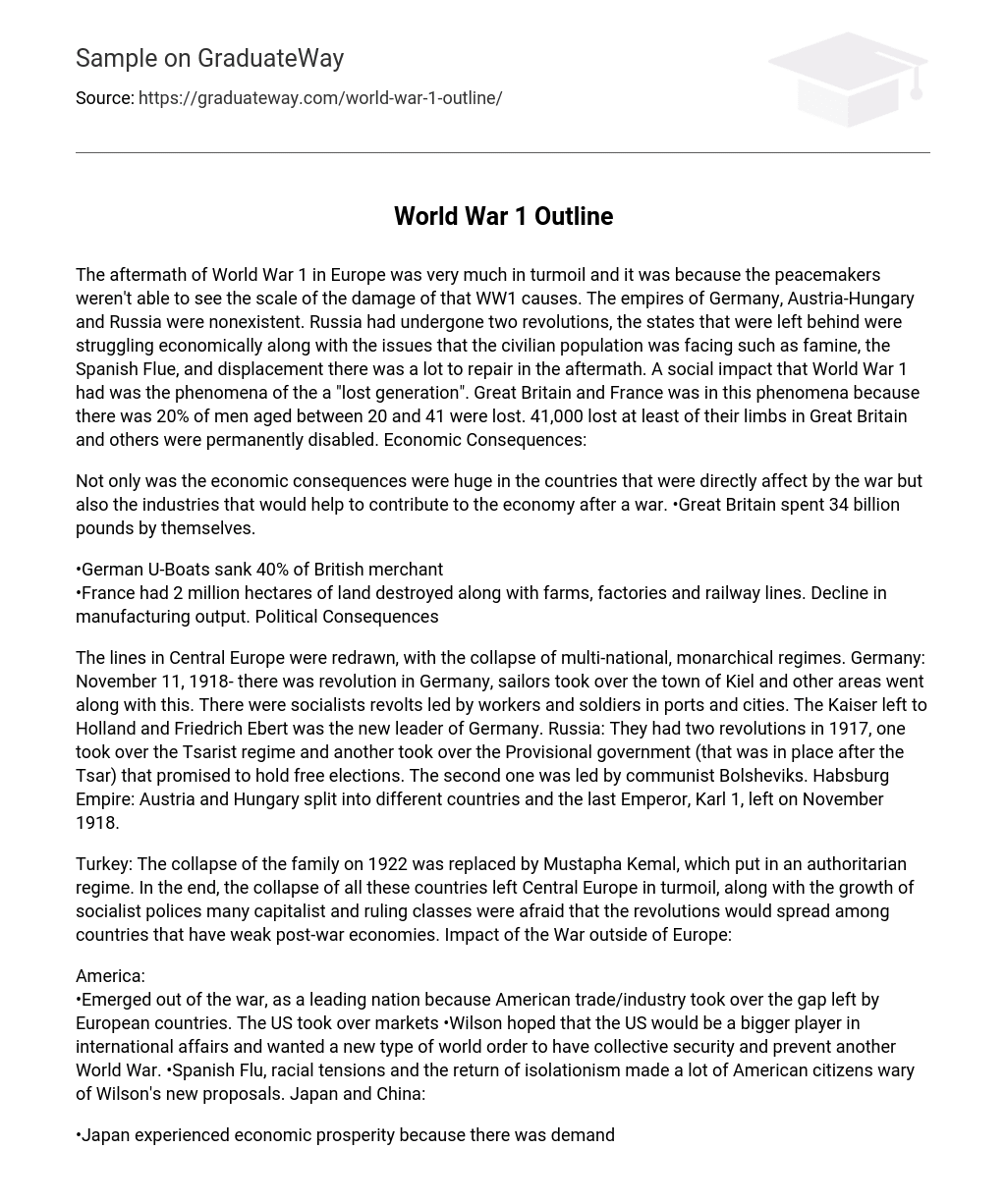The aftermath of World War 1 in Europe was very much in turmoil and it was because the peacemakers weren’t able to see the scale of the damage of that WW1 causes. The empires of Germany, Austria-Hungary and Russia were nonexistent. Russia had undergone two revolutions, the states that were left behind were struggling economically along with the issues that the civilian population was facing such as famine, the Spanish Flue, and displacement there was a lot to repair in the aftermath.
A social impact that World War 1 had was the phenomena of the a “lost generation”. Great Britain and France was in this phenomena because there was 20% of men aged between 20 and 41 were lost. 41,000 lost at least of their limbs in Great Britain and others were permanently disabled. Economic Consequences:
Not only was the economic consequences were huge in the countries that were directly affect by the war but also the industries that would help to contribute to the economy after a war.
- Great Britain spent 34 billion pounds by themselves.
- German U-Boats sank 40% of British merchant
- France had 2 million hectares of land destroyed along with farms, factories and railway lines. Decline in manufacturing output.
The lines in Central Europe were redrawn, with the collapse of multi-national, monarchical regimes. Germany: November 11, 1918- there was revolution in Germany, sailors took over the town of Kiel and other areas went along with this. There were socialists revolts led by workers and soldiers in ports and cities.
The Kaiser left to Holland and Friedrich Ebert was the new leader of Germany. Russia: They had two revolutions in 1917, one took over the Tsarist regime and another took over the Provisional government (that was in place after the Tsar) that promised to hold free elections. The second one was led by communist Bolsheviks. Habsburg Empire: Austria and Hungary split into different countries and the last Emperor, Karl 1, left on November 1918.
Turkey:
The collapse of the family on 1922 was replaced by Mustapha Kemal, which put in an authoritarian regime. In the end, the collapse of all these countries left Central Europe in turmoil, along with the growth of socialist polices many capitalist and ruling classes were afraid that the revolutions would spread among countries that have weak post-war economies. Impact of the War outside of Europe:
America:
- Emerged out of the war, as a leading nation because American trade/industry took over the gap left by European countries. The US took over markets
- Wilson hoped that the US would be a bigger player in international affairs and wanted a new type of world order to have collective security and prevent another World War.
- Spanish Flu, racial tensions and the return of isolationism made a lot of American citizens wary of Wilson’s new proposals.
Japan and China:
- Japan experienced economic prosperity because there was demand for Japanese products and there were new markets that they took a chance on.
- They expanded land-wise, taking German holdings in Shandon and islands in the Pacific.
- Japan sent a list of 21 demands in order to have an iron fist on the Chinese economy and political system
- China entered the war in 1917 and a voice in the new treaty being written but their goals were the complete opposite of Japan.
Problems facing the peacemakers in 1919: The Versailles peace conference was dominated by three political leaders:
- David Lloyd George-Prime Minister of the UK
- Georges Clemenceau-Prime Minister of France
- Woodrow Wilson-POTUS
There were three factors that made a treat hard to achieve:
- Different aims of peacemakers
- Nature of the Armistice settlement and mood of the German population
- Popular sentiment in the Allied countries.
Wilson had Fourteen Points which were his goals
- Abolition of secret diplomacy
- Free navigation at sea for all nations in war and peace
- Free trade between countries
- Disarmament by all Countries
- Colonies to have a say in their future
- German troops to leave Russia
- Restoration of inde. for Belgium
- France to regain Alsace and Lorraine
- Frontier between Austria and Italy
- Serbia to have access to the sea
- Self-determination for the peoples of Austria-Hungary
- Self-determination for the people in the Turkish Empire
- Poland to have access to the sea along with being independent.
- A League of Nations to be set up to preserve peace
The members of the Triple Ententa had different perspectives on how to punish Germany. Lloyd George wanted to include a disarmament clause to the Treaty because they didn’t want the German military to threaten the colonies of Great Britain ever again. They also wanted Germany to recover fast in order for them to trade more with them and to repel the growing threat of communism in Europe. Clemenceau of France wanted harsh settlements towards Germany because they wanted to keep Germany weak and they wanted Germany to pay back war damage in order for France to rebuild their country again. Armistice Settlement:
In the end, the German people were led to believe that the country were to rebuilt in the image of Wilson’s Fourteen points in order to not face “total defeat”. Also they believed that they were to play a role in the agreements of the Treaty and thought that the final punishment wasn’t going to be so harsh.





